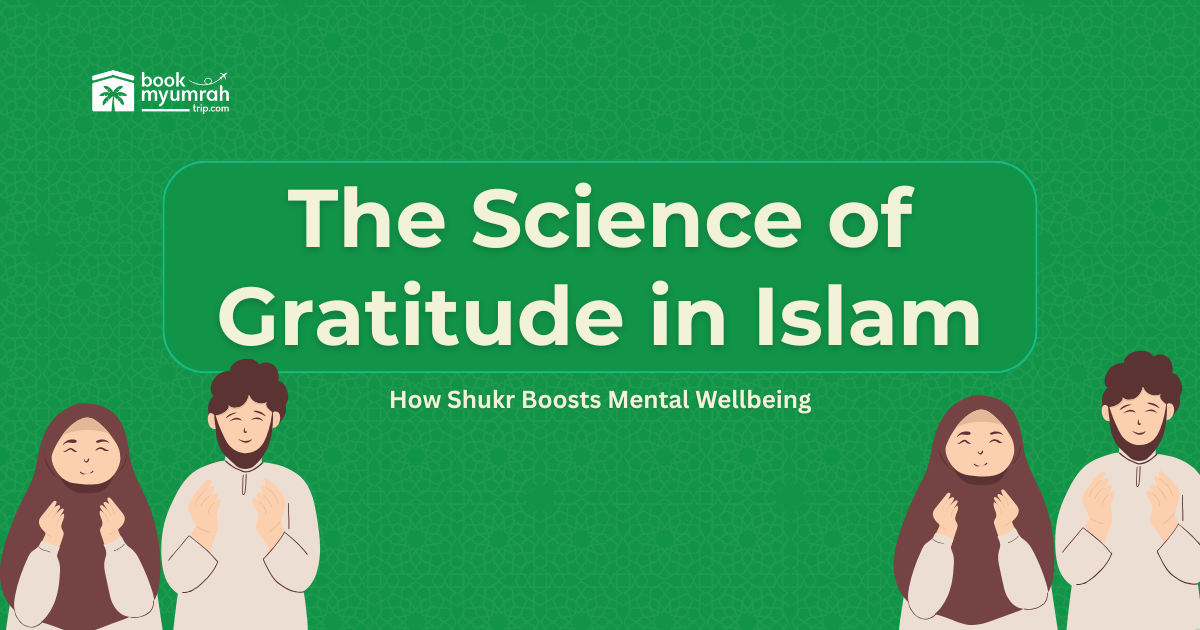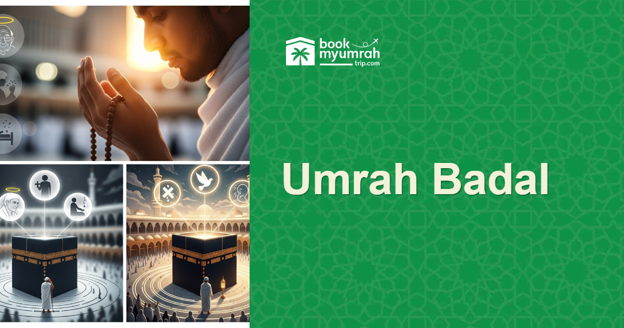The Science of Gratitude in Islam: How Shukr Boosts Mental Wellbeing

Team BookMyUmrahTrip
Gratitude in Islam (shukr) is not merely responding with a thank you to Allah ta’ala but a profound, spiritual endeavor that is centered in heart, tongue, and deed.
In this blog, we will discuss what is actually meant by the term "shukr" and its basis in the Quran and in hadith, the way modern psychology supports the advantages of shukr, and how you can incorporate it into your life to improve your mental health.
What is Shukr in Islam?
So, what is Shukr in Islam?
The Arabic term “shukr” means thankfulness and recognition of blessings. It involves not only knowing blessings but also bringing about the blessings. Shukr is experienced in the heart, as explained by scholars such as Ibn al-Qayyim; it is expressed through the tongue and performed by the deeds, as is the case.
Elements: action, tongue, heart.
Heart: Consciousness and thankful emotions.
Tongue: Saying “Alhamdulillah” verbally, doing dhikr (calling upon Allah), etc.
Action: Blessing is good, serving others, and worshiping Allah.
Obligation, not optional
The Quran puts shukr in context as being necessary; it differentiates between the grateful and the ungrateful. Those who are unthankful are threatened, and the thankful are rewarded.
Foundations of Gratitude in the Quran
Key verses from the Quran that highlight the importance of gratitude in Islam:
“If you are grateful, I will surely increase you [in favor]; but if you deny, indeed, My punishment is severe.” Surah Ibrahim 14:7
“O you who have believed, eat from the good [lawful] things which We have provided for you and be grateful to Allah if it is indeed Him that you worship.” Surah Al-Baqarah 2:172
Prophet stories & examples
Examples are the prophets: Prophet Ibrahim, Prophet Sulaiman, etc., who viewed their wealth and power as blessed and used it with humbleness, thanking Allah. Narrative and direct address are some of the methods used in the Quran to lead believers to shukr.
Hadiths & Duas: Living Gratitude
Hadiths on gratitude and adversity
How fine is the case of a believer; there is good in him in everything, and so I speak of a believer alone. When wealth is granted to him, he thanks Allah, and that is good for him; when misfortune comes to him, he bears it patiently, and that is better for him.
This hadith talks about how gratitude is not just confined to the good moments only but also covers the difficult moments of a believer’s life as well through patience (sabr), which, in turn, is extremely healing.
Duas with meanings
The following are two easy du'as that you may say:
Alhamdulillah "All praise to Allah. Use it during the day when you get blessings in your mind.
A longer du'a "Rabbana ma khalaqta hada batilan subhanak faqinana a-dhaba l-nar" Our Lord, You have not created this in vain. Glory be to You! Spare us the penalty of the Fire. (Quran 3:191, paraphrased) - showing gratitude towards creation and the blessings that exist in life.
Modern Science & Psychology: Gratitude and Mental Health
Research Backing
One meta-analysis of 145 studies in 28 countries established that gratitude interventions (keeping gratitude journals, expressing thanks, etc.) result in small but significant well-being gains in individuals.
A Nurses’ Health Study (approximately 49,000 older women) reported that even when health, socioeconomic status, and other factors were taken care of, women who scored in the top third on the gratitude scale had a 9% lower risk of dying within the four years.
Studies Among Muslims
In a study of Muslim American adolescents (N ≈ 202) who were asked to monitor gratitude to Allah and gratitude to people, both gratitude types have been discovered to be positively related to happiness and calmness and negatively related to anxiety and sadness. Thanks to individuals forecasting subsequent positive affect, particularly in cases where the gratitude to Allah was less, demonstrating that the two manifestations are complementary.
How Practicing Shukr Transforms Mental Well-being
Inner peace and contentment
By concentrating on blessings, the person becomes less focused on what he/she does not have but is focused on what he/she possesses. This creates satisfaction (rida) and less jealousy, comparison, and dissatisfaction.
Resilience in hardship
Gratitude and patience (sabr) view adversity not as a purposeless suffering but as something that has a spiritual value. It improves mental strength: individuals are less hopeless, and they can cope with stress.
Lowered anxiety and depression episodes
Thankfulness (for instance, journaling or self-reflecting) is scientifically proven to cut down on negative emotions, concern, and stress. It has effects of activating positive emotional circuits (in secular literature), and in Islamic practice, the remembrance of Allah (dhikr) is calming.
Better relationships and social mental well-being
Appreciation of other people leads to a positive relationship. Islam stresses the importance of thanking others: “He who does not appreciate people does not appreciate Allah. Thank you for fostering goodness, modesty, and relatedness.
Practical Ways to Cultivate Shukr Daily
Morning & evening reflection: In the morning or right before going to sleep, reflect on 3-5 blessings at present and say “Alhamdulillah,” for your Lord is ever merciful.
Gratitude Journaling: Count and write things that you are grateful for. This strengthens a good neural pattern.
Dhikr (Invocation) and Dua: Use words like ‘Alhamdulillah,’ ‘Subhan-Allah,’ and ‘Shukran lillah,’ and recite verses from the book of Allah, which talk about gratitude.
Act when there are good and bad times: Praise Allah when something good happens. Be patient when unwellness strikes, and keep the hadith of the believer in mind, that there is goodness in every affair.
Thank others: Thank parents, friends, and the community. Small acts count.
Mindfulness: Be now. Pay attention to little gifts a cool breeze, health, food, and company.
FAQs
1: Does this mean that shukr is only needed when there is goodness?
True shukr entails being thankful during our ease and being patient and grateful during the period of difficulty. The Muslim teaching is that no adversity does a believer any favor.
2: What is the frequency at which one should practice shukr to experience mental health benefits?
According to scientific articles, it may take only several minutes of journaling or a few words of gratitude each day over the course of weeks to demonstrate that well-being, mood, and stress levels improve. It is consistency that counts, rather than size.
3: Does it work to use shukr only in instances of someone facing depression, trauma, or serious mental health struggles?
Shukr is highly effective in the spiritual domain and alleviates mental disorders significantly; however, when addressing severe mental complications (clinical depression, PTSD, etc.), shukr in combination with professional assistance (therapy, counseling, relevant medical care) is suggested. Spiritual practices are not always adequate.


